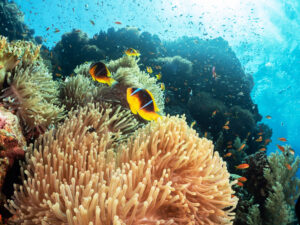Coral reefs
Worldwide, many coral reefs are threatened by human activities, both on a local scale (water pollution, destructive fishing) and a global scale (warming and acidification of the oceans).
Coral reefs
Worldwide, many coral reefs are threatened by human activities, both on a local scale (water pollution, destructive fishing) and a global scale (warming and acidification of the oceans).
Coral reefs
Coral reefs are complex, rich ecosystems of colonial floras and other living things in shallow seas. They are among the most biodiverse habitats on Earth, and are home to about 25% of all known marine life. Coral reefs are found mainly in tropical, clear seas where there is a lot of sunlight penetration. This is because corals live in symbiosis with tiny, photosynthetic algae called zooxanthellae. Coral reefs are also compared to tropical rainforests due to the enormous density of diverse life forms and topographical complexity.
Coral reefs are sensitive to external influences. Worldwide, many coral reefs are threatened by human activities, both on a local scale (water pollution, destructive fishing) and a global scale (warming and acidification of the oceans). Natural causes, such as invasive species, harsh storms or sedimentation can also affect reefs. An important issue in marine biology is not only how coral reefs work, but also how they can be protected and restored.


